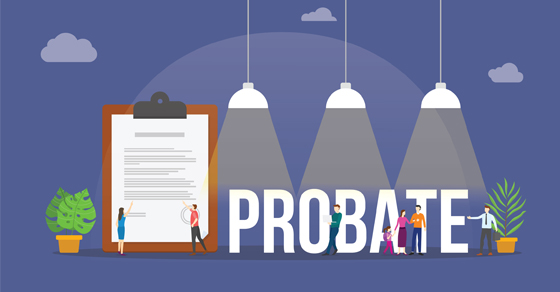The term “probate” is one you’ve probably heard and might associate with negative connotations. But you may not fully understand what it is. For some people, the term conjures images of lengthy delays waiting for wealth to be transferred as well as bitter disputes among family members. Others, because the probate process is open to the public, worry about their “dirty laundry” being aired out. The good news is that there are strategies you can employ to keep much or all of your estate out of probate.
Probate Primer
Probate is predicated on state law, so the exact process varies from state to state. This has led to misconceptions about the length of probate. On average, the process takes six to nine months, but it can run longer for complex situations in certain states. Also, some states exempt small estates or provide a simplified process for surviving spouses.
In Louisiana, a "probate" is referred to as a "succession." The terms "probate" and "succession" can be used interchangeably.
In basic terms, probate is the process of settling an estate and passing legal title of ownership of assets to heirs. If the deceased person has a valid will, probate begins when the executor named in the will presents the document to the county courthouse. If there’s no will — in legal parlance, the deceased has died “intestate”— the court will appoint someone to administer the estate. Thereafter, this person becomes the estate’s legal representative.
The Process
With that in mind, here’s how the process generally works. First, a petition is filed with the court of appropriate jurisdiction, providing notice to the beneficiaries named in the deceased’s will. Typically, such notice is published in a local newspaper for the general public’s benefit. If someone wants to object to the petition, they can do so in court.
The executor takes an inventory of the deceased’s property, including securities, real estate, and business interests. In some states, an appraisal of value may be required. Then the executor must provide notice to all known creditors. Generally, a creditor must stake a claim within a limited time specified under state law. The executor also determines which creditor claims are legitimate and then meets those obligations. He or she also pays any taxes and other debts that are owed by the estate.
Ownership of assets is then transferred to beneficiaries named in the will, following the waiting period allowed for creditors to file claims. If the deceased died intestate, state law governs the disposition of those assets. However, before any transfers take place, the executor must petition the court to distribute the assets as provided by will or state intestacy law.
Ways to Avoid Probate
Certain assets, such as an account held jointly or an IRA or bank account for which you’ve designated a beneficiary, are exempt from probate. But you also may be able to avoid the process with additional planning. The easiest way to do this is through the initial form of ownership or the use of a living trust.
Louisiana does not recognize the legal concept of "right of survivorship." In the case of joint ownership with rights of survivorship, you acquire the property with another party, such as your spouse. The property then automatically passes to the surviving joint tenant upon the death of the deceased joint tenant. In states that recognize the concept of "survivorship", this form of ownership typically is used when a married couple buys a home or other real estate.
A revocable living trust may be used to avoid probate and protect privacy. The assets are typically transferred to the trust during your lifetime and managed by a trustee that you designate.
Protect Your Privacy
The reason many people dread the word probate is the fact that it’s a public process. But by using the right strategies, you can protect your privacy while saving your family time, money and hardship. We can help you implement the right techniques.
Theus Law Offices specializes in a complete range of estate planning and elder law services, including wills, trusts, probate, successions, estate administration, and probate litigation. If you need a Louisiana wills and trusts lawyer or succession attorney in Alexandria, Lafayette, Lake Charles, Baton Rouge, New Orleans, Shreveport, Monroe, or elsewhere in Louisiana, let our certified estate planning specialist and probate lawyers help you.










